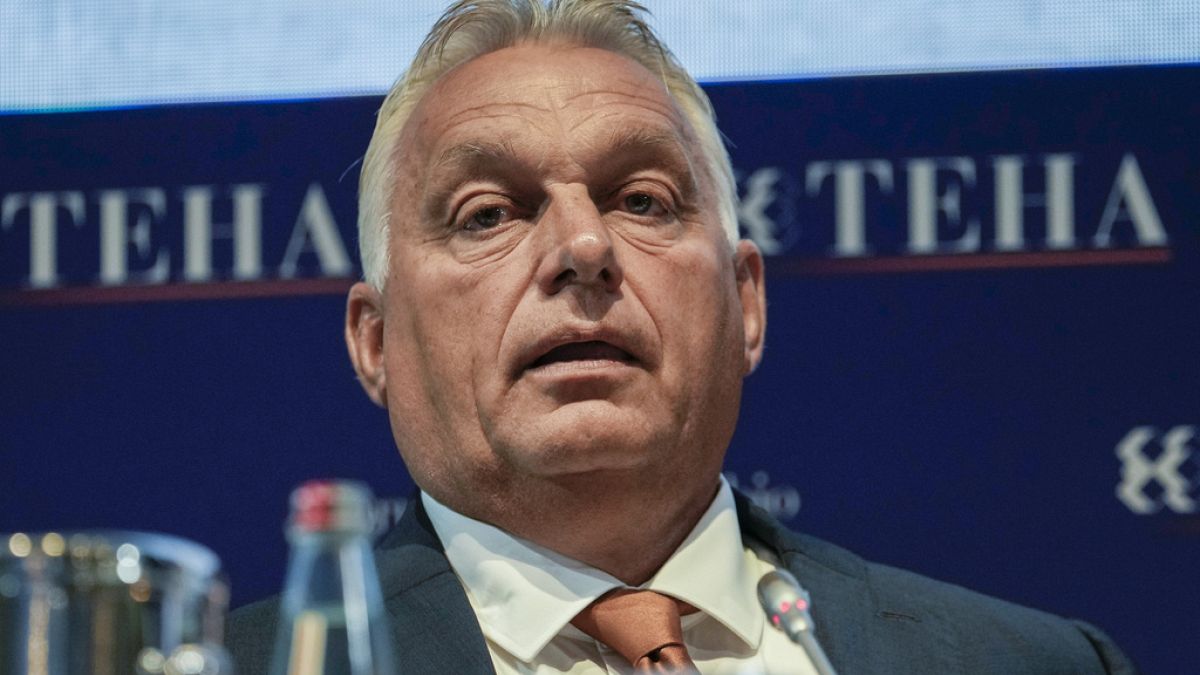Orbán calls for ceasefire between Russia and Ukraine

Hungarian Prime Minister Viktor Orbán presented the priorities of the Hungarian presidency to the European Parliament in Strasbourg, claiming that ‘Ukraine cannot win on the battlefield’.
Hungarian Prime Minister Viktor Orbán has outlined his country’s priorities for its presidency of the European Union, including calls for a ceasefire in Ukraine while addressing the European Parliament in Strasbourg.
During the speech, Orbán claimed that “Ukraine cannot win on the battlefield,” adding that it is in the European Union’s interest to establish better communication with Russia to negotiate a ceasefire.
His press conference was interrupted by a member of the Hungarian opposition, who threw fake banknotes at him and accused him of selling out to Russian President Vladimir Putin. The protester labelled Orbán a “traitor.”
Orbán, often criticised in the EU for his sympathetic stance towards Russia, told reporters: “Both the leaders in Ukraine and Russia are convinced time is on their side. So, they don’t want to compromise or make peace. They’ll keep presenting so-called winning plans, but they’re not ready for a ceasefire.”
He argued that pressure from the Global South is needed to push for peace. Meanwhile, he suggested that while individual EU countries could continue to support Ukraine with military aid, this should be done on a national level.
“Those who think what we’re doing as the EU is right can go on supporting the Ukrainians. But for those who disagree, like Hungary, we won’t. This should be up to national governments,” Orbán added.
While he acknowledged differences of opinion on the war with most EU member states, Orbán insisted that the majority of Europeans “want peace,” while EU leaders are in favour of continuing the conflict.
A tough line on migration
Orbán also used his address to push for stricter border controls and tougher EU-wide migration policies. He advocated for hotspots outside of the EU to process asylum claims and called for a regular “Schengen summit” to discuss border control.
He also reiterated his country’s request for an opt-out from the EU’s migration policy, an approach the Dutch government is now also considering. “The idea of a common migration policy is acceptable, but please let countries that can’t follow the mainstream have an opt-out. Otherwise, we will destroy the European Union.”
Orbán has also previously threatened to send refugees to Brussels in response to a fine imposed by the European Court of Justice for breaching EU asylum law. “We will respect European law and regulations. But if someone granted asylum in Hungary wants to go to Brussels, we are happy to help them.”
However, Dutch MEP Tineke Strik, the European Parliament rapporteur on Hungary, accused Orbán of undermining the EU’s common asylum system. In an interview with Euronews, she said: “He uses rhetoric to strengthen his position and blackmail the EU for more funding. He’s not complying with asylum obligations, and asylum seekers are being pushed back at Hungary’s borders.”
Hungarian EU presidency faces scrutiny
One of Orbán’s key priorities during Hungary’s EU presidency is to bring Romania and Bulgaria into the Schengen area. He also highlighted other goals, such as EU enlargement, improving business competitiveness, agricultural policy, and addressing Europe’s demographic challenges.
Since Hungary assumed the EU presidency in July, its diplomats have faced criticism, with several meetings boycotted by EU ministers. Meanwhile, around €21 billion in EU funds allocated to Hungary remain frozen due to concerns over the rule of law, and a European Parliament-triggered Article 7 procedure, which could strip Hungary of its voting rights in the EU Council, is still ongoing.
However, Orbán dismissed the concerns, describing the Article 7 process as “pure propaganda.” He expressed confidence in running the presidency smoothly, just as he did in 2011, saying, “My argument to other EU leaders is: If you trusted me once, trust me twice’.
Related
A New Book Argues That What Happens in Europe Doesn’t…
Remaking the World: European Distinctiveness and the Transformation of Politics, Culture, and the Economy by Jerrold Seigel “No issue in world
Poland plans military training for every adult male amid growing…
Poland’s prime minister, Donald Tusk, has said his government is working on a plan to prepare large-scale military training for every adult male in response t
2025 European Athletics Indoor Championships: Ditaji Kambundji secures women’s 60m…
Switzerland’s Ditaji Kambundji walked away from the 2025 European Athletics Indoor Championships in Apeldoorn on 7 March with much more than her first Europea
Takeaways from the EU’s landmark security summit after Trump said…
BRUSSELS (AP) — European Union leaders are trumpeting their endorsement of a plan to free up hundreds of billions of








